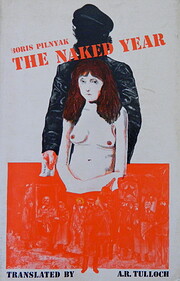

Clique em uma foto para ir ao Google Livros
|
Carregando... The Naked Year (original: 1922; edição: 1975)de Boris; Alexander R. Tulloch Pilnyak
Informações da ObraThe Naked Year de Boris Pilnjak (1922)
 Ainda não há conversas na Discussão sobre este livro. La sperimentazione di Pil'njak si mette al servizio del moderno epos rivoluzionario e utilizza elementi prettamente poetici quali la ripetizione che dà al testo la musicalità ritmica dei poemi epici della letteratura popolare e l'interruzione del flusso delle frasi, l'esposizione volutamente enigmatica e la ricerca di una comprensibilità incompleta e il linguaggio figurativo impiegato. -Arricchito da una (acida) (ma utile) postfazione di Solzhenitsyn (da cui ho attinto per il commento). sem resenhas | adicionar uma resenha
Notable Lists
It was his novel The Naked Year, a flinchingly honest portrayal of life in post-Revolutionary Russia, that catapulted Pilnyak into notoriety. The Naked Year follows the provincial town of Ordinin through 1919, a year of war, illness, and tumultuous change. The village and its inhabitants--merchants, nobles, peasants, and communists alike--experience firsthand the impact of the violent revolutionary struggle of the Reds, Whites, Blacks, and Greens, until their world eventually dissolves into chaos. So lyrical and surreal that it has been called the "anti-novel," The Naked Year captures the emotional heart of a land trapped in the horrific gap year between frenzied Revolution and rigid Soviet control Não foram encontradas descrições de bibliotecas. |
Current DiscussionsNenhum(a)Capas populares
 Google Books — Carregando... Google Books — Carregando...GênerosClassificação decimal de Dewey (CDD)891.7342Literature Literature of other languages Literature of east Indo-European and Celtic languages Russian and East Slavic languages Russian fiction USSR 1917–1991 Early 20th century 1917–1945Classificação da Biblioteca do Congresso dos E.U.A. (LCC)AvaliaçãoMédia: (3.69) (3.69)
É você?Torne-se um autor do LibraryThing. |
||||||||||||||||||||||||||||||||||||||||||||||||||||||||||||||||||||||||||||||||||||||||||||||||||||||||||||||||||||||||||||||||||||||
“The very shape of this novel is anti-Western…. In order to depict the [Russian] Revolution in terms of an anti-Western rebellion, and at the same time portray its chaotic nature, it was necessary that the form of the novel should also bear as little resemblance as possible to anything in Western culture, and produce feelings of confusion and incomprehension in the reader. Thus at first sight, to the uninitiated reader, the novel resembles an unsystematic collection of random jottings, disjointed or unrelated camera shots of the violation and disorder which characterized the Revolution. And…characters do not develop in the ‘normal’ way—they are presented in an impressionistic manner. They have little or no psychology and appear only to portray different viewpoints of the Revolution, or as the various aspects of pre- and post-Revolutionary society….”
Trying to present or recount the two-thirds I’ve read would be next to impossible. I do hope to return to this at some point, in part because from time to time I do feel like I have a sense of what Pilnyak is trying to do. But mostly it’s a slog and I don’t see it becoming easier. (